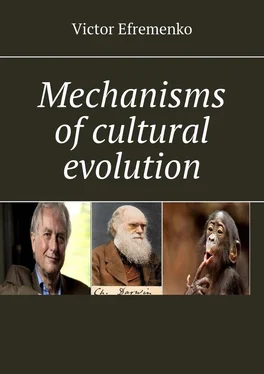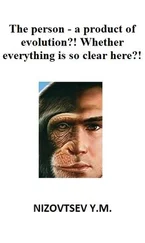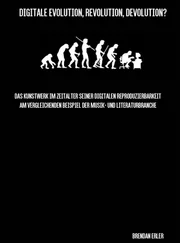Functional adaptations of the brain
The activity of the brain is a change in the functional state of its individual fragments (neurons). The essence of functional changes can be demonstrated using the example of a water tap. The water tap has two positions – «Open» and «Closed». The difference between these two functional states of the crane cannot be determined visually. The tap looks the same in both positions. If you supply water to its input, then the difference in these states will immediately be revealed. The difference manifests itself in the work, i.e. in behavior.
Mentality should be considered as a result caused by all functional states of parts of the brain, both consciousness, subconsciousness and unconsciousness. To a large extent, only the unconscious can be inherited, since it is the result of the work of genes.
Therefore, the mentality can only be partially inherited, and transmitted by genetics to the next generation of the species.
On the mechanisms of creation and preservation of cultural adaptations in the following chapters.
Culture and cultural evolution
From the point of view of sociobiology, culture can be defined in this way.
Culture is a manifestation in human behavior and thinking of a set of functional adaptations of the brain that arose as a result of the historical process of development of the species Homo sapiens, which are transmitted from person to person, from generation to generation in a non-genetic way.
Those who are trying to give a definition of culture that could combine into one group, for example, poetry, ballet and painting, cannot understand that such attempts are not constructive. Many philosophical definitions of culture have been invented, and none of them is meaningful. At the same time, everyone notes the complexity of constructing such a definition.
So you took the wrong side, gentlemen. Human culture can be correctly defined in terms of sociobiology, not philosophy.
It is obvious that cultural manifestations should be united not according to the ways of expressing thoughts, emotions, behavior in them, but according to the way these manifestations are inherited in societies. Culture is the accumulation and manifestation of the development of various aspects of the human personality, and what is common to all manifestations is that they are accumulated and transmitted to subsequent generations in a non-genetic way.
The evolution of culture should be considered as a change in time of the preserved manifestations (traces) of activity in different spheres of the social (living in society) man, just as the change in time of the remains of ancient animals is traces of biological evolution.
The term «culture» in this formulation acquires an expansive meaning, since it covers both science and religious beliefs, as was pointed out by the cultural scientist Yu. Lotman. It is impossible to argue with the fact that humanity is evolving. But not like other primates, not like other species. This is especially noticeable over the past 300 years, when science acquired a systematic character, uniting the islands of knowledge of previous eras.
Human evolution due to functional adaptations of the brain is fast, compared to slow biological evolution, which can therefore be ignored when analyzing the changes that occur in societies. You will not find an adequate definition of the concept of «cultural evolution» anywhere. This expression is replaced by the expression «cultural evolution», as if these are equivalent concepts. It is time, finally, to give the first adequate definition.
Cultural evolution – time-consistent changes in human culture in society, caused by functional changes in the brain. Culture is one shot from the film «Human Cultural Evolution».
In the process of biological evolution, with the appearance of a brain in multicellular organisms, it became possible in it to maintain functional adaptations that regulate behavior. The significance of non-genetic adaptations in humans has increased over time. Finally, evolution on a new trajectory, which led to the development of civilization, made the good old morphological methods of adaptation for Homo sapiens little in demand.
Although the world around us has changed greatly with the development of civilization, the global principles of evolution have been preserved. Now, as before, in order to survive in the World, you need to adapt to it. No other way. Living together in the modern world on one planet Earth, covered by numerous communications, will not work according to your own rules. Everyone needs to adapt in order to live.
Endless talks about unchanged sovereignty for states are manipulations of public opinion, psychological opium for the people. Sovereignty for states becomes limited. A discussion is permissible on the question of how best to fit into this world, with minimal losses for oneself. If, nevertheless, the discussion goes in the wrong direction, then perhaps the next branch of the evolution of intelligent beings will be an inorganic machine civilization.
Differences in human evolution from other species
Some people find it intolerable to realize that man and any kind of monkey have a common ancestor, that man is one of the species of the order of primates. I don’t understand this snobbery. But even among the human tribe, you can find representatives that seem terrible to every civilized person.
When you get to know a person, it is more correct to look not at his distant ancestors, but at what he is today. For a more detailed analysis, you should also pay attention to relatives.
In this section, we will show some of the differences between human evolution and the evolution of other mammalian species. According to the biological classification, it is customary to consider a person to be one of the species of the order of primates, therefore, he must obey the biological laws common to all, but this turns out to be not entirely true.
1. The basic model, which well describes the dynamics of animal population, is the logistic model proposed by the Belgian mathematician Verhulst back in 1838. The logistic curve, which is a solution to the Verhulstom equation, indicates a rapid increase in the number of the species at the beginning and a slowdown when it reaches the ceiling of the ecological niche. Thus, the capacity of an ecological niche is a systemic factor that determines the ceiling for population growth in a given habitat.
The logistic model reflects the dynamics of populations, the number of which, under any initial conditions, approaches with time to a certain stationary value.
Simply put, as long as there are resources for development, the number of this species grows rapidly, but resources are always limited, which causes limitation of the population size. Growth stops. The ecological niche is filled. A biological species is a passive consumer of existing resources.
Demography does not obey this law, although we are typical monkeys in morphology and mathematicians had to invent their own equations for humans that describe the demographic process.
On the models of population growth (http://www.keldysh.ru/papers/2005/prep13/prep2005_13.html)
This suggests that, under the guise of HS, someone has appeared whose numbers do not obey the general rule.
2. The ecological niche, which limits the distribution of any species, is expanded by man and is not a limiting parameter for him.
3. With an increase in the population size, the area occupied by it increases proportionally. So it was with HS. But for some time, people began to crowd into cities.
4. Natural selection is selection, as a rule, individual selection in populations. Different structures (state, private) appear in societies, and along with individual selection, there is also group selection, selection between social structures within states and between different states on the planet. In particular, the class struggle and other types of joint struggle of different social groups for some preferences is a manifestation of group selection.
Читать дальше












